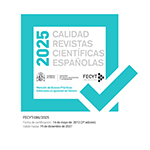Los afrancesados o una cuestión política: los límites del despotismo ilustrado
Abstract
As Andres Muriel asserted in 1820, the afrancesamiento was first of all a “political issue”: first, the Bayonne Assembly, which changed the concept of the Constitution as a more or less obvious package of basic laws, to that of a covenant between the People and the Sovereign, constituted a genuine revolution. Then, Spain had never experienced such important reforms as those that were taken by the government of Joseph I in 1809. This permited Juan Antonio Llorente to state that all the Lights of Spain had gathered in Madrid and Cadiz, and that there was no difference between Liberals and Afrancesados. This was missing the main thing: the structure of society, which was based in Cadiz on the evolution from the concept of subject to that of citizen, whereas in Bayonne the three estates of society and the privileges of the clergy and the nobility had been maintained.Downloads
Article download
License
In order to support the global exchange of knowledge, the journal Cuadernos de Historia Moderna is allowing unrestricted access to its content as from its publication in this electronic edition, and as such it is an open-access journal. The originals published in this journal are the property of the Complutense University of Madrid and any reproduction thereof in full or in part must cite the source. All content is distributed under a Creative Commons Attribution 4.0 use and distribution licence (CC BY 4.0). This circumstance must be expressly stated in these terms where necessary. You can view the summary and the complete legal text of the licence.












